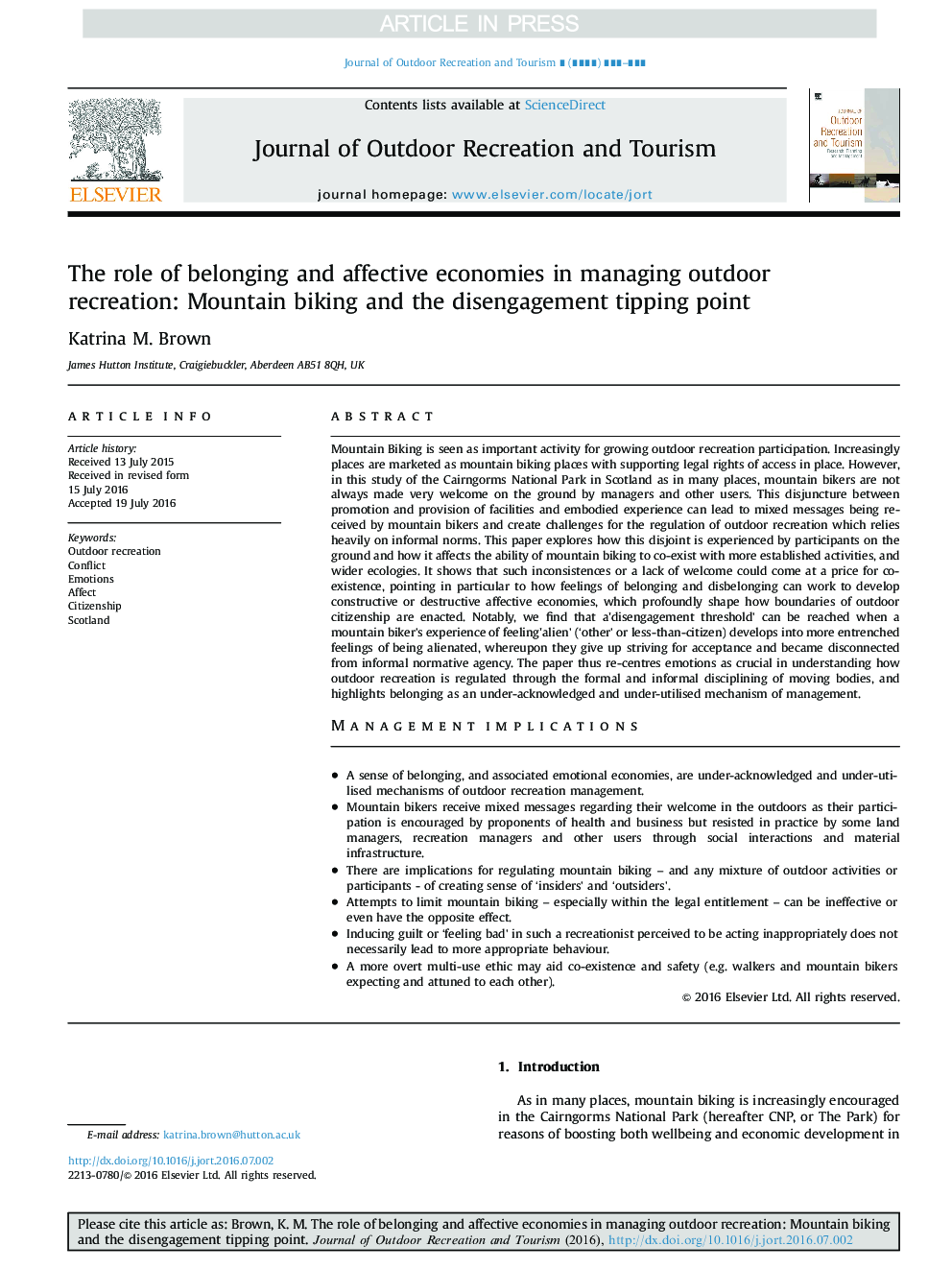| Article ID | Journal | Published Year | Pages | File Type |
|---|---|---|---|---|
| 4759865 | Journal of Outdoor Recreation and Tourism | 2016 | 12 Pages |
Abstract
Mountain Biking is seen as important activity for growing outdoor recreation participation. Increasingly places are marketed as mountain biking places with supporting legal rights of access in place. However, in this study of the Cairngorms National Park in Scotland as in many places, mountain bikers are not always made very welcome on the ground by managers and other users. This disjuncture between promotion and provision of facilities and embodied experience can lead to mixed messages being received by mountain bikers and create challenges for the regulation of outdoor recreation which relies heavily on informal norms. This paper explores how this disjoint is experienced by participants on the ground and how it affects the ability of mountain biking to co-exist with more established activities, and wider ecologies. It shows that such inconsistences or a lack of welcome could come at a price for coexistence, pointing in particular to how feelings of belonging and disbelonging can work to develop constructive or destructive affective economies, which profoundly shape how boundaries of outdoor citizenship are enacted. Notably, we find that a'disengagement threshold' can be reached when a mountain biker's experience of feeling'alien' ('other' or less-than-citizen) develops into more entrenched feelings of being alienated, whereupon they give up striving for acceptance and became disconnected from informal normative agency. The paper thus re-centres emotions as crucial in understanding how outdoor recreation is regulated through the formal and informal disciplining of moving bodies, and highlights belonging as an under-acknowledged and under-utilised mechanism of management.Management implications
- A sense of belonging, and associated emotional economies, are under-acknowledged and under-utilised mechanisms of outdoor recreation management.
- Mountain bikers receive mixed messages regarding their welcome in the outdoors as their participation is encouraged by proponents of health and business but resisted in practice by some land managers, recreation managers and other users through social interactions and material infrastructure.
- There are implications for regulating mountain biking - and any mixture of outdoor activities or participants - of creating sense of 'insiders' and 'outsiders'.
- Attempts to limit mountain biking - especially within the legal entitlement - can be ineffective or even have the opposite effect.
- Inducing guilt or 'feeling bad' in such a recreationist perceived to be acting inappropriately does not necessarily lead to more appropriate behaviour.
- A more overt multi-use ethic may aid co-existence and safety (e.g. walkers and mountain bikers expecting and attuned to each other).
- A sense of belonging, and associated emotional economies, are under-acknowledged and under-utilised mechanisms of outdoor recreation management.
- Mountain bikers receive mixed messages regarding their welcome in the outdoors as their participation is encouraged by proponents of health and business but resisted in practice by some land managers, recreation managers and other users through social interactions and material infrastructure.
- There are implications for regulating mountain biking - and any mixture of outdoor activities or participants - of creating sense of 'insiders' and 'outsiders'.
- Attempts to limit mountain biking - especially within the legal entitlement - can be ineffective or even have the opposite effect.
- Inducing guilt or 'feeling bad' in such a recreationist perceived to be acting inappropriately does not necessarily lead to more appropriate behaviour.
- A more overt multi-use ethic may aid co-existence and safety (e.g. walkers and mountain bikers expecting and attuned to each other).
Related Topics
Life Sciences
Agricultural and Biological Sciences
Forestry
Authors
Katrina M. Brown,
